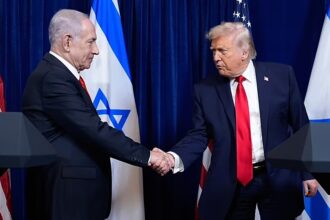CAIRO: Egypt’s stern rebuke to Israel over the deaths of five Egyptian security personnel is the clearest sign yet of cooling ties as Cairo’s military rulers try to appease a newly-assertive public largely antagonistic to the Jewish state.
The Arab world’s most populous nation is unlikely to scrap its 1979 peace treaty with Israel, cornerstone of a brittle power balance in the region, despite popular pressure following the overthrow of US-friendly leader Hosni Mubarak in February.
Yet the top army officers now in charge in Cairo have broken with Mubarak’s softly-softly approach.
Mubarak saw himself as a pioneer in the pursuit of Middle East peace, yet lost credibility among many Egyptians for what they saw as his failure to stand up to Israel and its powerful backer the United States.
"The Egyptian citizen, and the Arab citizen as a whole, is not ready to accept the kind of behavior that former president Mubarak and his group used to accept," said Nabil Abdel Fattah of the Al-Ahram Centre for Political and Strategic Studies.
The wind began to change soon after Mubarak’s removal. Egypt made goodwill gestures to Israel’s arch-foe Iran, eased the isolation of Islamist group Hamas in Gaza by opening the border with the territory and brokered a reconciliation deal between Hamas and Palestinian President Mahmoud Abbas’s Fatah movement.
It also moved to redraw contracts for gas export to Israel to squeeze a better deal.
When five Egyptian security personnel were killed during an Israeli clash with gunmen who had killed eight Israelis close to the Sinai border on Thursday, Egypt accused Israel of breaching their peace treaty and said it would recall its ambassador.
Blood
"Egyptian blood is not cheap and the government will not accept that Egyptian blood gets shed for nothing," state news agency MENA quoted a cabinet statement as saying.
Egypt’s Information Minister Osama Heikal told state TV: "The assurance that Egypt is committed to the peace treaty with Israel … should be reciprocated by an equivalent commitment and an adjustment of Israeli statements and behavior regarding various issues between both countries."
As crowds of Egyptians protested angrily at the Israeli embassy in Cairo through Saturday night, burning Israeli flags in scenes that would never be allowed during the Mubarak era, both countries were trying to defuse the diplomatic crisis.
But restraint was in short supply among the contenders to become Egypt’s future leader in elections due by year-end.
"Israel must realize that the day when Egypt’s sons are killed without an appropriate and strong reaction are over," wrote presidential hopeful Amr Moussa – former secretary-general of the Arab League – on his website.
Another contender for the leadership, Hamdeen Sabahy, hailed a protester who scrambled atop the Israel embassy in Cairo in the early hours of Saturday to remove and burn the Israeli flag as a "public hero".
"The future holds more deterioration in relations," said Shadi Hamid, director of research at the Brookings Doha Centre. "But it won’t reach the level of scrapping the Camp David agreement. It will be more of a colder peace, like Turkey’s relations with Israel."
Tensions over Sinai
Change may be felt most in the lawless desert region that straddles the Egyptian-Israeli border.
Egypt demanded an apology when Israeli Defense Minister Ehud Barak pointed to Egypt’s weak hold on Sinai to explain the killing on Thursday of the eight Israelis on a desert road north of the Red Sea resort of Eilat.
Israeli officials said the gunmen reached the area by travelling from Gaza through Egyptian Sinai then across the border with Israel. The five Egyptians died in an Israeli security sweep following the attack.
"Sinai’s security is a purely Egyptian affair and Egypt won’t accept any intervention, whether through action, statement or opinion, from any exterior party," said Heikal.
Gunmen have exploited the upheaval in Egypt to attack installations and pipelines in Sinai supplying Israel and Jordan with gas in recent months.
Egyptian forces began a military operation to root them out last week, but many Egyptians blame the weak security in the area on the peace deal with Israel, which puts strict limits on military deployment and other activity in Sinai.
Angry callers to Egyptian television stations on Sunday asked how Egypt could combat militants and still adhere to those restrictions.
Egyptian authorities have tried to stamp their authority on Sinai’s native Bedouin, in vain. The Bedouin complain of deliberate isolation by Cairo.
Repeated arrests of local men and the inability of the Bedouin to register and own land have bred resentment, stymied development and encouraged a vacuum of authority now being exploited by Islamist militant groups operating across the border with Gaza.
"This incident may be an opportunity to request an adjustment of the conditions that govern the presence of the Egyptian army in Sinai," said Mustapha Al-Sayyid, political science professor at Cairo University. –Additional reporting by Yasmine Saleh

